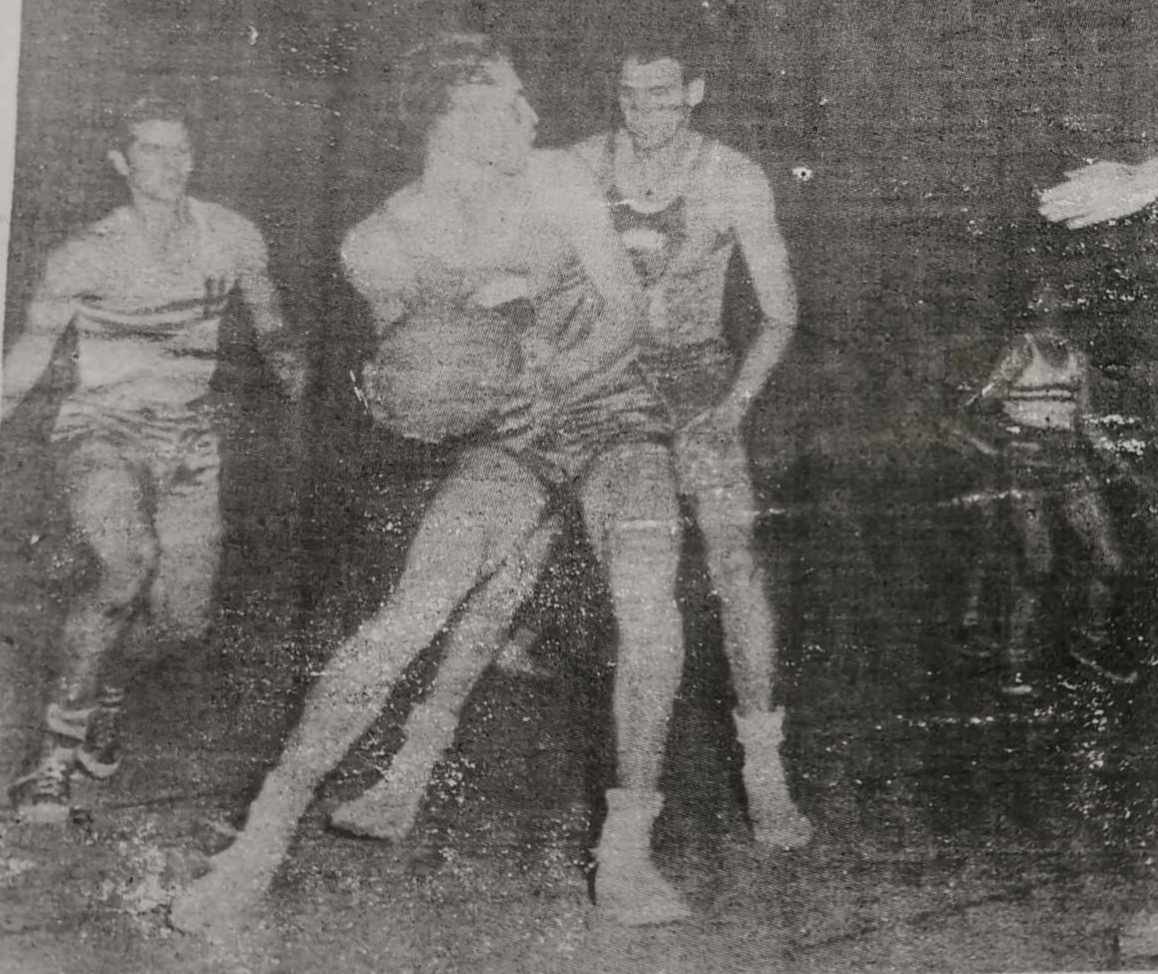
by Henry L. Liao
Once upon a time, the world was sweeter than we knew – but that was once upon a time very long ago.
The words remind me of the yesteryears when the Filipinos were not only the cage kingpins in Asia but also respectable before the eyes of the world basketball community.
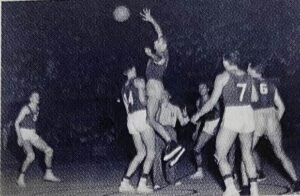
It was in the fifties and sixties, and somehow once upon a time never came again.
Why all the melodrama? It’s because it gives me goose pimples while reminiscing about the stunning performance of our national men’s basketball team during the 1954 World Basketball Championships (now known as the FIBA World Cup) in Rio de Janeiro, Brazil from October 22 to November 5, 1954.
In those quadrennial festivities, the Filipinos grabbed the bronze medal for the highest finish ever by any Asian country (until now). Only perennial powerhouse (gold) and host Brazil (silver) fared better than our boys.
Take note: Heading into the 2023 FIBA World Cup set to unwrap on August 25 in Indonesia, Japan and the Philippines, we are one of only 16 countries to make it to the medal podium (bronze, silver or bronze) since the FIBA World Cup first saw the light of day in 1950 in Buenos Aires, Argentina.

A dozen countries were in attendance during the 1954 edition. Seven came from the Americas, three hailed from Europe and two came from Asia – the Philippines and Formosa (Taiwan/now known as Chinese-Taipei.
Despite employing a second-rate unit composed of players from the Peoria Caterpillars, who were the then-reigning Amateur Athletic Union (AAU) national champion, the United States crushed host Brazil, 62-41, in the gold-medal contest en route to an unblemished 9-0 record.
There are two reasons why the Americans were unable to send their best amateur team from the top colleges and universities. The date of the tournament made it practically impossible to call on players from prominent colleges and universities. It was aggravated by the fact that the tournament largely had been south of the Equator, thus choosing the dates unsuitable for teams coming from the North.
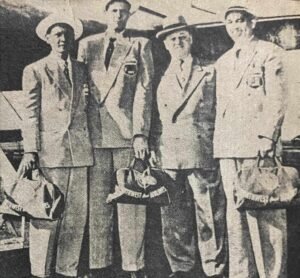
The U.S.’ smallest winning margin was five points, a 64-59 (30-26) decision over sixth-place Uruguay in the eight-team final round.
Brazil settled for the silver with an 8-1 record, including a pair of victories over the Philippines. The scores: 99-63 (44-22 at the half) in the two-game preliminary round and 57-41 (35-23 at the half) in the final phase.
The Philippines defeated South America’s Paraguay, 64-52 (26-27 at halftime), in its first game behind 17 points from Asia’s best Carlos (Caloy) Loyzaga. Despite a subsequent 99-63 debacle at the hands of Brazil during which the multi-faceted 6-foot-3, 200-pound Loyzaga netted only nine markers – his lone single-digit output – the Pinoys advanced to the final round of eight teams.
In the final round, the Philippines fell to the eventual titlist United States, 56-43, but not before giving the Yanks a scare.
Trailing by only three points, 25-22, at the break, the stubborn RP outfit rallied at the start of the second half and grabbed a 31-26 advantage. However, the American’s offense eventually got rolling and, with three minutes left, the U.S. took control, 49-30, with an 18-0 bomb to seal the deal.

Kirby Minter, a 6-foot-6 forward, topped the Americans with 15 points. Loyzaga was one of three Filipinos with twin-digit scores. Team skipper Lauro (The Fox) Mumar, who nearly failed to make it to the tournament, paced our boys with 14 points. The bull-strong Loyzaga contributed 12 and 6-foot-2 Jose Rizal College hotshot Mariano (The Feet) Tolentino added 11.
The Philippines then defeated the Republic of China (now Chinese-Taipei), 61-44, with Loyzaga chalking up 10 points, and Israel, 90-56, behind Loyzaga’s 18 scores. It lost to Brazil for a second time, 57-41, with Caloy tallying 15, before bouncing back to beat Canada, 83-76, as Loyzaga knocked in 13 points.
Then came the game against fourth-ranked France. The Philippines needed to win against the French to reach the medal podium. We were not to be denied. Our boys eked out a 66-60 victory in their penultimate game in the final phase (where all eight teams faced each other on a round-robin basis without any playoffs) to officially clinch the bronze medal. Caloy broke the 20-point barrier for the first time with exactly 20.

In the Philippines’ farewell appearance, Loyzaga torched sixth-place Uruguay with a tournament-high 33 points as the San Beda College product propelled the team to a 67-63 win despite the absence of team head coach Herminio (Herr) Silva, who had called in sick that day. (Note that Caloy scored nearly half of the team’s total output.)
With the national team traveling on a shoestring budget and handicapped by a lack of personnel (Silva did not have an assistant), Mumar assumed coaching duties aside from playing.
The Philippines finished with a 6-3 overall record in the tournament. Loyzaga ranked third among the scoring leaders with a 16.4-point average in nine assignments. Only Uruguay’s Oscar Moglia (18.6 ppg) and Canada’s Carl Ridd (18.2 ppg) registered higher scoring averages.
Deservedly so, Loyzaga earned a berth on the World All-Tournament Second Team (out of three teams).
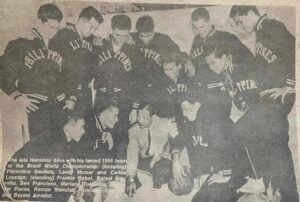
Backing up Loyzaga on the PH offensive end were the quick and wily Mumar and Nano Tolentino, who normed 9.3 ppg and 9.1 ppg, respectively.
Other players on the historic Philippine squad (with their colorful monikers) were the following: Antonio (Spitfire) Genato, Napoleon (Chink/Hook Shot) Flores, Francisco (The Rajah of Rebounds) Rabat, Florentino (Pong/Bote) Bautista Jr., Rafael (The Rock) Barretto, Benjamin Francisco, Ponciano (Pons) Saldana, Bayani (Dirty Hero) Amador and Ramon (Cool) Manulat.
Not known to many were the alternate players on the team – Francis Wilson and Alfredo Sagarbarria.
+++
The Captain, Lauro Mumar, had considered the WBC bronze medal-winning feat as his most outstanding accomplishment as a player and the most memorable because of the harrowing experience he had undergone before making the trip to Rio de Janeiro, the site of the games.
“We made a niche in Philippine basketball and I was part of it,” said Mumar in a 1981 article in Celebrity magazine. “I also suffered a lot. I was suspended by the Philippine Amateur Athletic Federation (PAAF) – the harbinger of the Philippine Olympic Commission (POC) – through its Basketball Committee for my refusal to join the team in our tuneup games in the States.
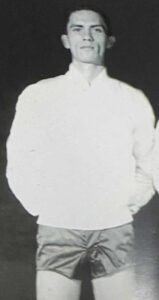
“I did not want to go because of financial reasons. My suspension for disciplinary action created a national uproar. (Manila) Mayor Arsenio Lacson and Senator Claro Recto started to lambast the Federation. It got to a point where then-Philippine president (Ramon) Magsaysay called me up to find out what the problem was. I explained my side and Magsaysay reconvened the Federation so that an open hearing on my case could be held.
“I was very heartened by the offer of many people to come to my defense in the hearing at the old Manila Hotel. I graciously refused the offer since I thought I didn’t need a lawyer. All I had to do was tell the truth. Well, I was exonerated, and Magsaysay sent me to join the team in the States.
So did Mumar, a foxy 6-1 frontline, make it to the national team to the World competitions in Brazil.
Recalled Mumar of his World experience: “The procedure (format) then was tough and rugged. We were divided into five groups, with two teams from each group qualifying (for the second round). The other 10 teams played each other regardless of the results of the qualifying round, unlike nowadays when the results of the eliminations are carried into the finals. We had been there (in Rio de Janeiro) for almost three weeks and we had been playing almost every day.
“Finally we reached the last day. The game (vs. Uruguay) had no bearing. Even if we lost, we would still have been third. But to a man, the players said that we should win for our country, for our (sick) coach. We had to win so that there would be no question that we deserved and that only two teams beat us – the first and the second placers. It really touched me. Everyone forgot our MICAA rivalries so that we could work better as a team.”
All was well that ended well.
- GOLD FOR OBIENA? - July 25, 2024
- Diana Taurasi’s Golden Opportunity at the 2024 Paris Olympics - July 10, 2024
- Auerbach’s 12 Favorite Playoff Players - June 5, 2024
